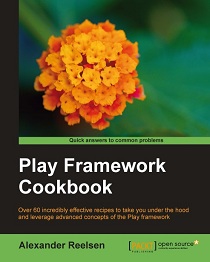Play Framework Cookbook
eBook Details:
- Paperback: 292 pages
- Publisher: WOW! eBook (August 8, 2011)
- Language: English
- ISBN-10: 1849515522
- ISBN-13: 978-1849515528
eBook Description:
Over 60 incredibly effective recipes to take you under the hood and leverage advanced concepts of the Play framework
- Make your application more modular, by introducing you to the world of modules.
- Keep your application up and running in production mode, from setup to monitoring it appropriately.
- Integrate play applications into your CI environment
- Keep performance high by using caching
- Learn how to leverage external APIs without letting your application go down on problems
- Use the play framework as a provider for your API systems
- Implement your own authorization mechanisms, and different output formats
In Detail
The Play framework is the new kid on the block of Java frameworks. By breaking with existing standards the play framework tries not to abstract away from HTTP as most web frameworks do, but tightly integrates with it. This means quite a shift for Java programmers. Understanding these concepts behind the play framework and its impact on web development with Java are crucial for fast development of applications.
The Play Framework Cookbook starts where the beginner documentation ends. It shows you how to utilize advanced features of the Play framework – piece by piece and completely outlined with working applications!
The reader will be taken through all layers of the Play Framework and provided with in-depth knowledge from as many examples and applications as possible. Leveraging the most from the Play framework means to think simple again in a java environment. Implement your own renderers, integrate tightly with HTTP, use existing code, improve site performance with caching and integrate with other web services and interfaces. Learn about non-functional issues like modularity or integration into production and testing environments. In order to provide the best learning experience during reading Play Framework Cookbook, almost every example is provided with source code, so you can start immediately to integrate recipes into your own play applications.
What you will learn from this book :
- Write own render methods to return custom formats for creating custom PDFs or RSS and ATOM feed responses
- Understand internal caching and implement your own cache in just a few lines of code
- Use existing modules to incorporate legacy spring or guice applications
- Integrate external APIs into your own application without affecting your application during downtimes
- Add custom monitoring points deep inside your application to simplify bottleneck detection
- Create your own API which gets exposed to the world wide web
- Leverage the validation abilities of the play framework to make sure you always handle valid data to your backend
- Create your own modules to make your application as reusable as possible
- Improve performance by setting up multi node environments without struggling through the usual pitfalls
- Provide integration to your operation monitoring systems like nagios or icinga
- Implement messaging capabilities by connecting to apache camel or rabbitmq
- Improve searching of data in a multi node setup by searching via apache solr
Approach
This book is in Packt’s Cookbook series. A Packt Cookbook contains recipes for solutions to the most important problems you face when working with a topic.
Inside the Cookbook you will find:
- A straightforward and easy to follow format
- A selection of the most important tasks and problems
- Carefully organized instructions for solving the problem efficiently
- Clear explanations of what you did
- Details for applying the solution to other situations
Who this book is written for
This is the ideal book for people who have already written a first application with the Play Framework or have just finished reading through the documenation. In other words – anyone who is ready to get to grips with Play! Having a basic knowledge of Java is good, as well as well as some web developer skills – HTML and JavaScript.
[download id=”324″ format=”1″]
